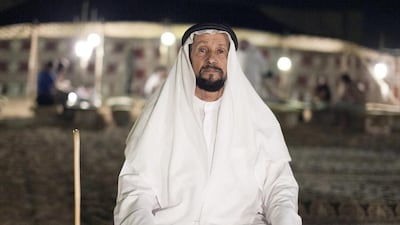DUBAI // The number of Emiratis who can recall life before oil, motorways and air conditioning is decreasing with each passing year. As the UAE moves forward on the international stage, the older generation is fearful the stories and traditions that sustained them are in danger of being lost forever.
Hamad Saeed Al Ketbi was a child when Dubai started on the path to modernity. The grandfather, who does not know his exact age but is “around 80”, spends his days regaling tourists at the Dubai Desert Conservation Reserve with tales of his life as a Bedouin.
Mr Al Ketbi loves keeping the history of his tribespeople alive, but fears few younger Emiratis will be as keen to step into his shoes.
“People don’t see this life, so I’m happy to talk about it,” he said. “The young have let go of the traditions. They’ve become too accustomed to studies of the book rather than the majlis.
“School and education has taken over, but the community is a school, too. These traditions you only learn by gathering with people, sitting and learning from each other. Not from schools.”
Encouraging Emiratis to work in tourism is a challenge across the emirates. Mr Al Ketbi is one of a handful of elderly citizens regularly interacting with visitors.
“I don’t think there are people in the young generation who can do what I do,” he said. “Many know more than me but I don’t think they have the patience to do this. They’re the ones who take the government jobs.”
Ahmad Al Minhali and Ismail Al Hajj, both 23, perform the Yola dance at the reserve, which is operated by Platinum Heritage. Although acknowledged as an important tradition among their community, such roles are not seen as “proper jobs”.
“I wanted to do something to help keep the traditions alive,” said Mr Al Minhali, a student at Al Ghurair University. “Really, I only do this because of the culture. We’re presenting our history.”
Mr Al Hajj agrees: “I do this to showcase my culture. It makes us feel proud.”Both men were discouraged by friends and family from working at the reserve.
“Our families are proud of us for doing this but, of course, they advise us to find something better in the future,” Mr Al Minhali said. “For example, in the police force there is a clear promotion path which we don’t have here.”
Both men agreed that long hours and low pay deters Emiratis from entering the tourism industry.
Emirati cultural ambassador Nasif Kayed, director of the Sheikh Mohammed Centre For Cultural Understanding, said attitudes must change. “When students graduate, firstly they’re looking for compensation, then lower workloads and finally a job that benefits the country and society. This we need to flip to make the last the first.”
He said pay is a major issue in attracting Emiratis to work at the centre.
“My biggest challenge is to pay them a competitive salary. You need someone intelligent, well spoken, fluent in English, I’m not going to get that for Dh10,000 a month.”
mswan@thenational.ae

